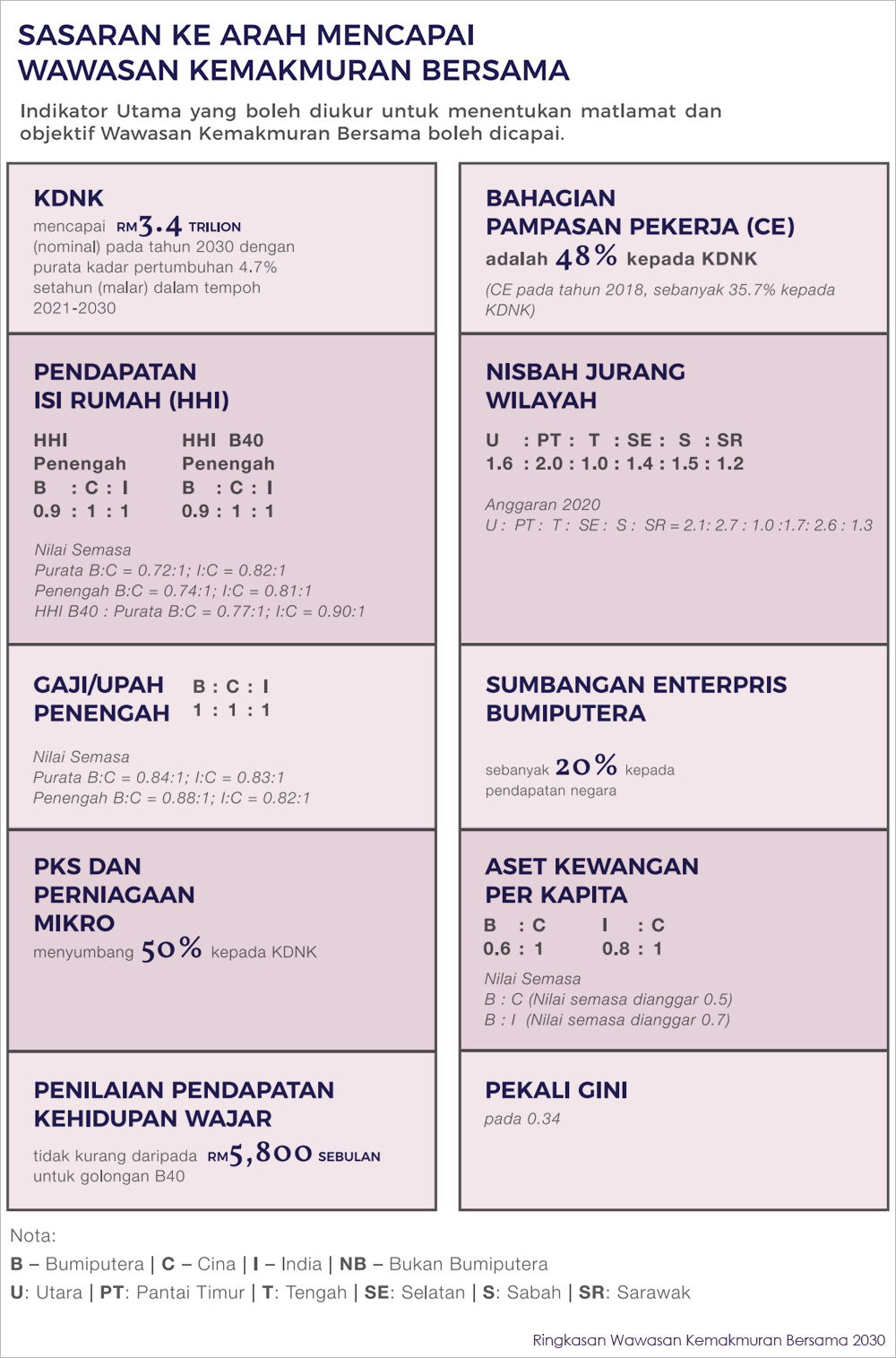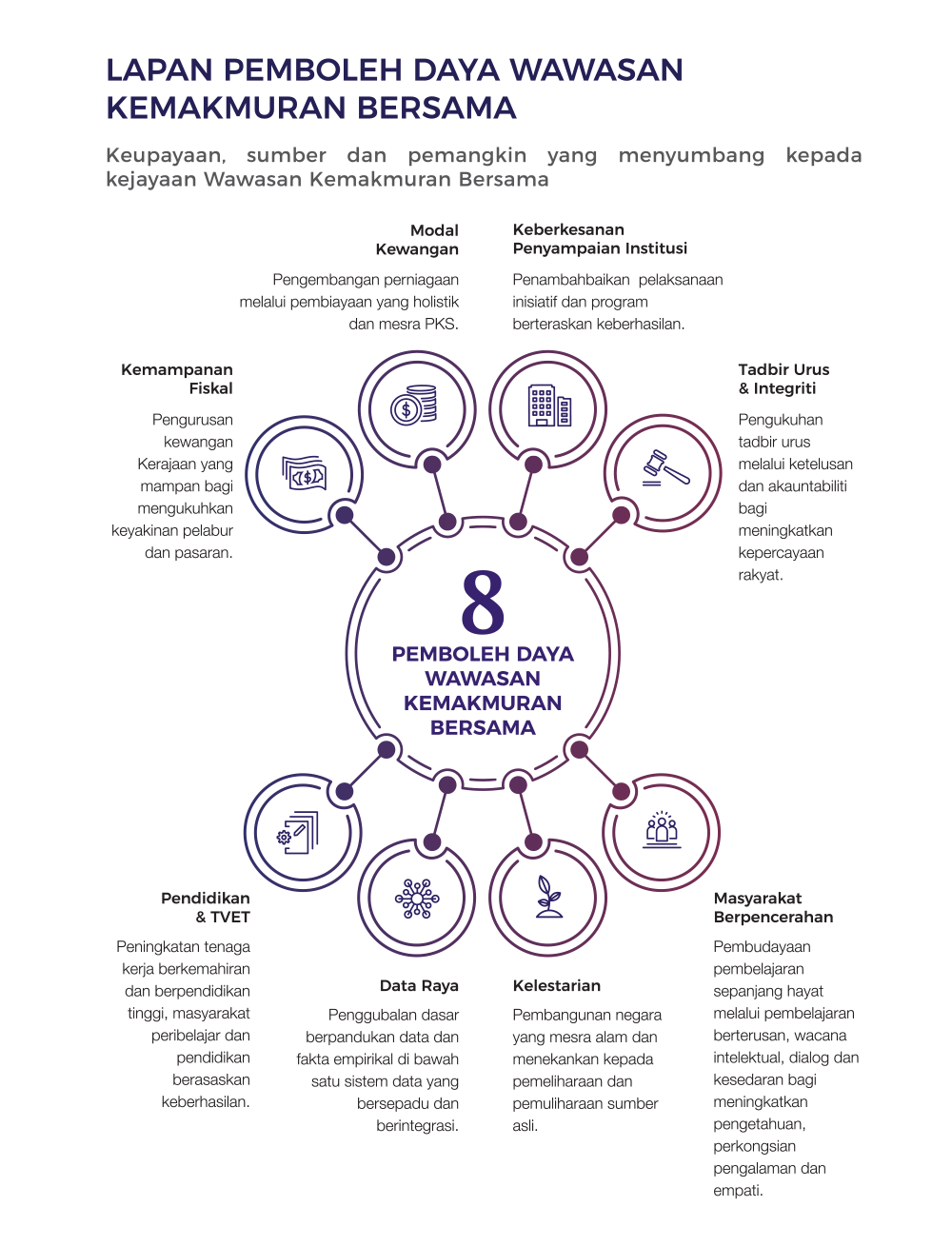Malaysia telah pun merangka pelan pembangunan negara setiap 10 tahun. sebelum ini Dasar Ekonomi Baru, Wawasan 2020 dan TN50 menjadi bahan perbincangan jika diambil kira mengenai pembangunan negara. setelah Kerajaan Baru mengambil alih pentadbiran negara maka tercetusnya idea untuk melakarkan Pelan Pembangunan Negara dan diberikan nama Wawasan Kemakmuran Bersama 2030. WKB2030 ialah dokumen yang menggariskan matlamat sepuluh tahun bermula tahun 2020 sehingga tahun 2030 untuk penstrukturan semula ekonomi ekonomi kemahiran rendah Malaysia kepada ekonomi berasaskan pengetahuan, dengan rakyat menikmati standard kehidupan yang baik.Ia dirangkan Kementerian Hal Ehwal ekonomi dan Institut Masa Depan Negara, dan dibentang di kabinet pada 15 September.
Wawasan Kemakmuran Bersama 2030?
Tiga elemen tunjang yang membantu untuk menegakkan keberkesanan WKB2030 adalah :
- Menstruktur Semula Ekonomi
- Menangani Ketidaksamaan
- Membina Negara
WKB 2030 menetapkan 3 objektif utama iaitu:1. Pembangunan untuk semua bagi mewujudkan ekonomi yang distruktur semula, progresif, berpaksikan ilmu dan bernilai tinggi dengan penyertaan masyarakat yang menyeluruh di semua peringkat.2. Menangani jurang kekayaan dan pendapatan supaya rakyat yang ketinggalan dapat dibawa bersama dalam arus kemajuan negara, nasib mereka terbela dan keupayaan ekonomi mereka diperkasakan.3. Negara bersatu, makmur dan bermaruah untuk menjadikan Malaysia sebuah negara yang bersatu, makmur dan bermaruah seterusnya muncul sebagai paksi ekonomi Asia.
Berikut takrifan rasmi WKB2030: "Wawasan Kemakmuran Bersama 2030 adalah iltizam untuk menjadikan Malaysia sebagai sebuah negara yang terus membangun secara mampan seiring dengan pengagihan ekonomi yang adil, saksama dan inklusif pada semua peringkat kumpulan pendapatan, etnik, wilayah dan rantaian bekalan."Iltizam ini akan diteruskan ke arah mengukuhkan kestabilan politik dan meningkatkan kemakmuran negara serta memastikan rakyat bersatu padu tanpa prasangka dengan meraikan kepelbagaian bangsa dan budaya sebagai asas penyatuan negara bangsa."
Seperti dasar ekonomi sebelum ini seperti Dasar Ekonomi Baru (DEB), WKB2030 ialah dokumen dasar kerajaan, bukan panduan kaedahnya. Ia akan menjadi panduan untuk kerajaan merangka dasar ekonomi untuk sepuluh tahun akan datang.
Kementerian dan jabatan kerajaan perlu merangka dan melaksana perancangan untuk mencapai sasaran itu. Strategi pelaksanaan mungkin akan digariskan dalam Rancangan Malaysia akan datang.
Pertumbuhan ekonomi Malaysia ketinggalan berbanding Asia Timur kerana kebergantungan terhadap komoditi eksport yang harganya tidak stabil. Tidak seperti ekonomi Asia Timur, penggunaan teknologi tinggi di Malaysia masih rendah.
Kerajaan juga berdepan jurang pendapatan yang semakin melebar antara majikan dengan pekerja, kelas, wilayah dan kaum.
Penyertaan bumiputera masih tidak memadai dalam sektor profesional, perusahaan kecil dan sederhana dan sumbangan pendapatan langsung dalam Keluaran Dalam Negara Kasar (KDNK). Sumbangan bumiputera kepada KDNK, jika tidak mengambil kira syarikat berkaitan kerajaan (GLC), dilaporkan pada kadar 28 peratus pada 2014.

Sementara DEB menumpukan untuk merapatkan jurang kekayaan dan peluang sama rata, prinsip di belakang WKB2030 ialah pertumbuhan ekonomi melalui "kesaksamaan keberhasilan".
Menurut dokumen itu, DEB ialah dasar afirmatif yang menambahkan kekayaan sejumlah bumiputera tetapi tidak mencapai matlamat asalnya.
"Ketirisan dalam pelaksanaan dasar (DEB), penyalahgunaan kuasa dan rasuah merupakan cabaran utama dalam mencapai kesaksamaan keberhasilan dalam agenda bumiptera.
"Sehubungan itu, pendekatan dasar, intervensi dan program yang lebih komprehensif dalam mencapai kesaksamaan keberhasilan adalah penting bagi mencapai matlamat WKB kepada semua kumpulan pendapatan, etnik, wilayah dan rantaian bekalan," kata dokumen itu.
Bagaimanapun kesaksamaan keberhasilan hanyalah satu daripada 15 prinsip panduan WKB2030.
Dari segi pendapatan penengah isi rumah, nisbah antara bumiputera dengan kaum Cina ialaih 0.74:1. Nisbah antara India dengan Cina pula ialah 0.81:1.
WKB2030 ingin mengurangkan jurang tersebut kepada hampir setara (0.9:1:1).
Ada tujuh teras strategik dan sejumlah cadangan bagaimana ia dapat dilaksana. Dokumen itu juga menggariskan lapan "pemboleh daya" berkenaan cara kerajaan boleh berperanan untuk mencapai strategi itu.

Adakah Dokumen Ini Terhad Kepada Golongan Bumiputera Sahaja?

jika kita rujuk kepada Bab sembilan khusus untuk "keberhasilan bumiputera".
"Keberhasilan bumiputera perlu diberi keutamaan serta diterapkan secara sistematik dalam setiap teras strategik dan pemboleh ubah untuk mencapai matlamat WKB.
"Golongan bumiputera perlu mengambil inisiatif untuk melakukan perubahan minda dan sikap yang drastik dengan menunjukkan iltizam yang kuat bagi meningkatkan produktiviti bumiputera," kata dokumen itu.
Dalam aspek hala tuju, matlamat WKB2030 adalah untuk kerajaan merangka dasar bagi menangani amalan diskriminasi terhadap pekerja bumiputera dalam sektor swasta dan perniagaan bumiputera.
Matlamat lain termasuk memecahkam monopoli, menggalakkan pemilikan hartanah di kawasan bandar dan pembangunan ekonomi di Perlis, Kedah, Kelantan, Terengganu, Sabah dan Sarawak.
Adakah ia menetapkan lebih banyak tindakan afirmatif?
Tidak. Istilah "tindakan afirmatif" hanya disebut dua kali dalam dokumen itu, dan dengan nada negatif.
Bagaimanapun, salah satu prinsip panduan WKB2030 ialah "pendekatan ekonomi keperluan", yang mengutamakan perangkaan dasar berasaskan target demografik yang khusus.
Secara spesifik, pendekatan ini memerlukan penakrifan semula "kemiskinan".
Wawasan WKB2030 akan diterjemahkan kepada strategi dan tindakan yang akan dijajarkan dalam Rancangan Malaysia ke-12 yang akan diumumkan pada tahun hadapan,
Saya berharap pelan yang dirangka dapat mencapai matlamat. 15 Teras yang disenaraikan didalam Konteks WKB2030 mampu menjana sokongan rakyat. Pencapaian ini akan diukur mengikut keberkesanan perlaksanaan di akar umbi. Perpaduan dan Patriotisma menjadi tunjang kemenangan prestasi pencapaian. Saya berhara wawasan ini bukan lah seperti yang diimpikan sewaktu wawasan 2020 dan TN 50 dirangka. ia menjadi sejarah yang tidak dapat dicapai. mekanisma atau feasibility yang terdapat dalam Pelan ini mampu mengerakkan kearah kemenangan besar.
Yang Benar
Sivanesan Tamil Selvam




